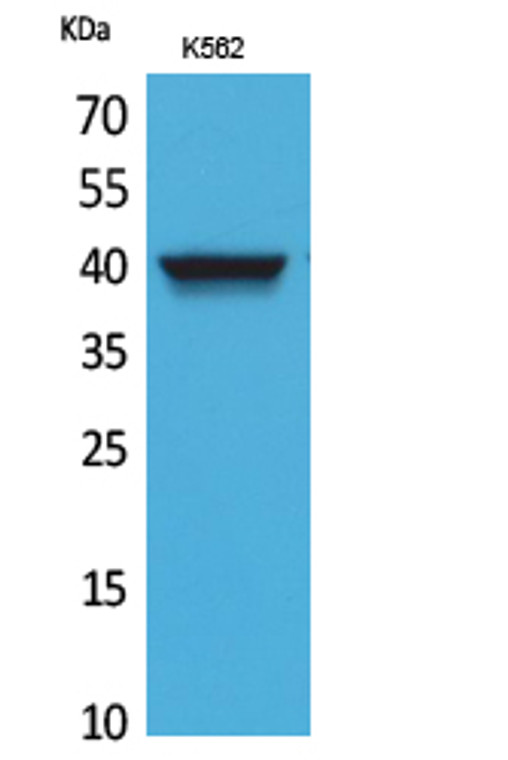| Host: |
Rabbit |
| Applications: |
WB/IHC/IF/ELISA |
| Reactivity: |
Human/Rat/Mouse/Pig/Chicken |
| Note: |
STRICTLY FOR FURTHER SCIENTIFIC RESEARCH USE ONLY (RUO). MUST NOT TO BE USED IN DIAGNOSTIC OR THERAPEUTIC APPLICATIONS. |
| Short Description: |
Rabbit polyclonal antibody anti-C-X-C chemokine receptor type 3 (161-210 aa) is suitable for use in Western Blot, Immunohistochemistry, Immunofluorescence and ELISA research applications. |
| Clonality: |
Polyclonal |
| Conjugation: |
Unconjugated |
| Isotype: |
IgG |
| Formulation: |
Liquid in PBS containing 50% Glycerol, 0.5% BSA and 0.02% Sodium Azide. |
| Purification: |
The antibody was affinity-purified from rabbit antiserum by affinity-chromatography using epitope-specific immunogen. |
| Concentration: |
1 mg/mL |
| Dilution Range: |
WB 1:500-1:2000IHC-P 1:100-300ELISA 1:20000IF 1:50-200 |
| Storage Instruction: |
Store at-20°C for up to 1 year from the date of receipt, and avoid repeat freeze-thaw cycles. |
| Gene Symbol: |
CXCR3 |
| Gene ID: |
2833 |
| Uniprot ID: |
CXCR3_HUMAN |
| Immunogen Region: |
161-210 aa |
| Specificity: |
CXCR-3 Polyclonal Antibody detects endogenous levels of CXCR-3 protein. |
| Immunogen: |
The antiserum was produced against synthesized peptide derived from the Internal region of human CXCR3 at the amino acid range 161-210 |
| Post Translational Modifications | Sulfation on Tyr-27 and Tyr-29 is essential for CXCL10 binding and subsequent signal transduction induction. N-glycosylated. |
| Function | Isoform 1: Receptor for the C-X-C chemokine CXCL9, CXCL10 and CXCL11 and mediates the proliferation, survival and angiogenic activity of human mesangial cells (HMC) through a heterotrimeric G-protein signaling pathway. Binds to CCL21. Probably promotes cell chemotaxis response. Isoform 2: Receptor for the C-X-C chemokine CXCL4 and also mediates the inhibitory activities of CXCL9, CXCL10 and CXCL11 on the proliferation, survival and angiogenic activity of human microvascular endothelial cells (HMVEC) through a cAMP-mediated signaling pathway. Does not promote cell chemotaxis respons. Interaction with CXCL4 or CXCL10 leads to activation of the p38MAPK pathway and contributes to inhibition of angiogenesis. Overexpression in renal cancer cells down-regulates expression of the anti-apoptotic protein HMOX1 and promotes apoptosis. Isoform 3: Mediates the activity of CXCL11. |
| Protein Name | C-X-C Chemokine Receptor Type 3Cxc-R3Cxcr-3Ckr-L2G Protein-Coupled Receptor 9Interferon-Inducible Protein 10 ReceptorIp-10 ReceptorCd Antigen Cd183 |
| Database Links | Reactome: R-HSA-380108Reactome: R-HSA-418594 |
| Cellular Localisation | Isoform 1: Cell MembraneMulti-Pass Membrane ProteinIsoform 2: Cell Membrane |
| Alternative Antibody Names | Anti-C-X-C Chemokine Receptor Type 3 antibodyAnti-Cxc-R3 antibodyAnti-Cxcr-3 antibodyAnti-Ckr-L2 antibodyAnti-G Protein-Coupled Receptor 9 antibodyAnti-Interferon-Inducible Protein 10 Receptor antibodyAnti-Ip-10 Receptor antibodyAnti-Cd Antigen Cd183 antibodyAnti-CXCR3 antibodyAnti-GPR9 antibody |
Information sourced from Uniprot.org
12 months for antibodies. 6 months for ELISA Kits. Please see website T&Cs for further guidance










